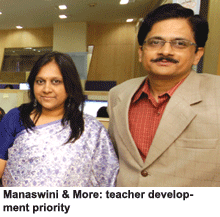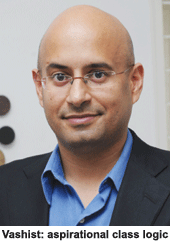Post-liberalisation India’s new genre of unstoppable education entrepreneurs — may their tribe increase — have hit upon a new middle-of-the-pyramid market segment, and have launched several affordable schooling initiatives within this high-potential price-sensitive education sector. Dilip Thakore reports
 The countrywide furore over the high cut-off percentages being demanded by colleges affiliated with Delhi University — by common consensus India’s best varsity — is an indicator that years of under-funding and neglect of Indian education is beginning to manifest by way of massive shortages and distortions in the country’s crumbling secondary and higher education systems. A pall of gloom has descended upon India’s 1.30 million schools, 509 colleges and 31,000 universities with several high-potential reforms promised by the Foreign Universities, National Commission for Higher Education & Research and National Council for Teacher Education Bills almost forgotten, and even the historic Right to Free & Compulsory Education Act, 2009 (aka Right to Education Act) which became law on April 1, 2010, having proved a non-starter. Against this gloomy backdrop, a new crop of private sector initiatives in affordable schooling has sprouted new buds of hope.
The countrywide furore over the high cut-off percentages being demanded by colleges affiliated with Delhi University — by common consensus India’s best varsity — is an indicator that years of under-funding and neglect of Indian education is beginning to manifest by way of massive shortages and distortions in the country’s crumbling secondary and higher education systems. A pall of gloom has descended upon India’s 1.30 million schools, 509 colleges and 31,000 universities with several high-potential reforms promised by the Foreign Universities, National Commission for Higher Education & Research and National Council for Teacher Education Bills almost forgotten, and even the historic Right to Free & Compulsory Education Act, 2009 (aka Right to Education Act) which became law on April 1, 2010, having proved a non-starter. Against this gloomy backdrop, a new crop of private sector initiatives in affordable schooling has sprouted new buds of hope.
With the high-end ‘international’ schools sector (hitherto experiencing furious growth) being accessible to only the rich, and admission into the country’s 293,000 private schools (including 175,885 unaided or financially independent primary-secondaries) becoming impos-sibly competitive for the nation’s fast-expanding middle class (for whom the country’s 1.26 million government schools characterised by ramshackle infrastructure, chronic teacher absent-eeism and abysmal learning outcomes, are a no-fly zone), post-liberalisation India’s new genre of unstoppable education entrepreneurs — may their tribe increase — have hit upon the large middle-of-the pyramid market segment, and have launched several ‘affordable schools’ initiatives within this high-potential price-sensitive education sector.
Among the first enterprises to get off the starting blocks in the new race to tap the massive potential of the affordable (private) schools market segment is the Hyderabad-based Rumi Education Pvt. Ltd (Rumi, estb. 2007). Rumi is the brain-child of Richard Chandler, a reclusive Singapore-based investment banker and philanthropist committed to the promise of affordable, quality education world-wide. Following several years of research into affordable private school-ing, the Richard Chandler Corporation (which has invested in telecommuni-cations, electric utilities, steel, oil, gas and banking in Asia, Africa, Latin America and Eastern Europe) pledged to invest US $100 million (Rs.450 crore) in this effort.
Rumi Education is the flagship initiative of this commitment. Rumi’s business model is to partner with affordably-priced schools helping them improve their academic standards. The company does this by offering curri-culum support to client schools through teaching guides, learning aids, teacher training and a series of programmes and services to improve learning outcomes and nurture students to become smarter, creative and expressive learners.
 “We started our operations in 2008 by working with ten budget schools in Hyderabad. This initiative enabled us to understand the unique problems and challenges of budget and affordably priced schools,” says Raj Grover, a science and business management graduate of Bombay University, and vastly experienced marketing professional who served with several hard-driving consumer companies including Nestle, Wrigley and HMV. Switching tracks, Grover accepted Chandler’s offer to head and operationalise Rumi Education, named after Jalal-ud-Din Muhammad Rumi, a 13th century Persian poet and mystic whose poetry is experiencing a global renaissance.
“We started our operations in 2008 by working with ten budget schools in Hyderabad. This initiative enabled us to understand the unique problems and challenges of budget and affordably priced schools,” says Raj Grover, a science and business management graduate of Bombay University, and vastly experienced marketing professional who served with several hard-driving consumer companies including Nestle, Wrigley and HMV. Switching tracks, Grover accepted Chandler’s offer to head and operationalise Rumi Education, named after Jalal-ud-Din Muhammad Rumi, a 13th century Persian poet and mystic whose poetry is experiencing a global renaissance.
Following a market survey conducted by IMRB (Indian Market Research Bureau) which interviewed 1,632 sample respondents in lower and middle middle class households, promoters, principals and students about their expectations of school education, Rumi discovered a huge new market segment comprising newly middle class citizens ready, willing and able to pay for quality education in the range of Rs.500-1,000 by way of monthly tuition fees.
“Since 2008, when we started offering our services package for upgradation of private aided and unaided primary and secondary schools, we have received tremendous word-of-mouth and referral advertising and have signed agreements with over 50 schools in Hyderabad and 26 in Andhra Pradesh. And recently we have begun to offer our package of services to schools in Haryana, Punjab, Delhi, Maharashtra and MP. This is an idea whose time has come,” adds Grover.
The seeds of this education jasmine revolution were planted in receptive Indian soil in the early years of the new millennium by Dr. James Tooley. While on an International Finance Corporation assignment in India, Tooley chanced upon numerous private ‘budget schools’ operating in Hyderabad to which poor slum households were sending their children, paying tuition fees of Rs.75-100 per month in the hope of their receiving half-useful English medium education. In an intellectual epiphany, Tooley discovered that even desperately poor parents scratching out precarious livelihoods as rickshaw-drivers and construction labour were aware of a truth which had eluded — and continues to elude — bureaucrats in the education ministries at the Centre and in the states, viz, that private for-profit education with emphasis on learning English from the early years, is the passport out of the vicious circle of poverty and ignorance in which the overwhelming majority of post-independence India’s poor have been trapped for several centuries.
 In the wretched slums of Hyderabad, Tooley unearthed a large number of ‘unrecognised’ low-cost primary sch-ools run by education entrepreneurs, which are widely perceived as superior to free-of-charge state government primaries. Tooley also discovered that remarkably, despite the low tuition fees demanded by budget school promoters operating out of make-shift premises, they still eked out modest profits. “Private schools for the poor are burgeoning across the developing world. In many urban areas they are serving the majority of poor schoolchildren. Their quality is higher than of government schools provided for the poor — perhaps not surprisingly given that they are predominantly businesses depen-dent on fees to survive and, hence, are directly accountable to parental needs,” wrote Tooley in his seminal and well- researched book The Beautiful Tree (Penguin 2009) — the title inspired by an observation by Mahatma Gandhi to the effect that the indigenous gurukul school system of education based on peer learning had bloomed into a beautiful tree until the administrators of the British Raj cut it down and replaced it with the Macaulayian system in the mid-19th century.
In the wretched slums of Hyderabad, Tooley unearthed a large number of ‘unrecognised’ low-cost primary sch-ools run by education entrepreneurs, which are widely perceived as superior to free-of-charge state government primaries. Tooley also discovered that remarkably, despite the low tuition fees demanded by budget school promoters operating out of make-shift premises, they still eked out modest profits. “Private schools for the poor are burgeoning across the developing world. In many urban areas they are serving the majority of poor schoolchildren. Their quality is higher than of government schools provided for the poor — perhaps not surprisingly given that they are predominantly businesses depen-dent on fees to survive and, hence, are directly accountable to parental needs,” wrote Tooley in his seminal and well- researched book The Beautiful Tree (Penguin 2009) — the title inspired by an observation by Mahatma Gandhi to the effect that the indigenous gurukul school system of education based on peer learning had bloomed into a beautiful tree until the administrators of the British Raj cut it down and replaced it with the Macaulayian system in the mid-19th century.
The numerous case histories of much-maligned penny entrepreneurs driven by enlightened self-interest providing education to millions of children in the slums and rural outbacks of India, Nigeria, Ghana, Kenya and even communist China at rock-bottom monthly tuition fees of $2-5 (Rs.90-225), cited by Tooley in The Beautiful Tree, were greeted with typical indifference and/or tepid enthusiasm by academia and the intelligentsia in India.
 However they aroused the interest of Chandler, the low-profile New Zealand born, Singapore-based billionaire private investor and promoter chairman of the Richard F. Chandler Corporation (mission statement: “to build prosperity for tomorrow’s world”). With one of the objectives of this emerging markets-focused private investment firm being to “build businesses that develop human capital and advance prosperity through education and healthcare in developing countries,” Chandler teamed up with Tooley, and the Chandler Corporation’s Orient Global Investment Fund invested modest sums in several budget schools in Hyderabad on a pilot basis, to test the possibility of investing in them as a business proposition.
However they aroused the interest of Chandler, the low-profile New Zealand born, Singapore-based billionaire private investor and promoter chairman of the Richard F. Chandler Corporation (mission statement: “to build prosperity for tomorrow’s world”). With one of the objectives of this emerging markets-focused private investment firm being to “build businesses that develop human capital and advance prosperity through education and healthcare in developing countries,” Chandler teamed up with Tooley, and the Chandler Corporation’s Orient Global Investment Fund invested modest sums in several budget schools in Hyderabad on a pilot basis, to test the possibility of investing in them as a business proposition.
Evidently this experiment to infuse venture capital into budget schools catering to bottom-of-the-pyramid households proved unsuccessful, presumably because the cash flows of budget schools are too tight to be suitable for private equity finance. Since then Tooley has reportedly returned to the education faculty of Newcastle-Upon-Tyne University, though accor-ding to the Wikipedia he continues to chair several companies promoting low-cost schools in China and Kenya.
Likewise, abandoning the idea of funding budget schools for children from bottom-of-the-pyramid households which are properly the province of microfinance rather than investment finance corporates, in 2007 Chandler promoted Rumi Education Pvt. Ltd with a mandate to provide improved learning outcomes services to next-level K-12 schools on a revenue sharing model.
Rumi’s new target market segment is a few notches above the heavily populated base of India’s iniquitous socio-economic pyramid, it is nonetheless huge, with the number of households with annual incomes of Rs.1-3 lakh aspiring for quality English medium K-12 education priced at Rs.6,000-12,000 per year estimated at 65 million. Also wiser from the budget schools funding experience, this time round Chandler appointed Grover — a hard core marketing professional with valuable price-sensitive marketing experience in Nestle (1985-95), Wrigley India (1995-2000), and the RPG Group’s HMV music marketing company (2000-04) — to run a tight-ship business enterprise.
The choice proved fortuitous because within the three years since Rumi commenced operations, it has signed full-service delivery contracts with 115 affordable schools in four states. In the process Grover has quickly aggregated a 70-strong team of teacher trainers, content developers and sales personnel led by highly qualified professionals. “Of the total number of 80,000 integrated K-X schools in India, a mere 15,000 are affiliated with the CBSE, CISCE and international examination boards. Rumi’s objective is to improve and upgrade the other 65,000 schools affiliated with state examination boards countrywide, although some CBSE schools have also signed up with us. These are the affordably priced schools which require our services to raise them to the next level,” says Grover (see interview).
 Rumi’s market development strategy which has enabled the company to get off to a fast start and acquire first-mover’s advantage in this segment is explained by Amit Sinha, a business management graduate of Punjab University who acquired valuable domain experience in IT education multinationals NIIT and Aptech (1991-2001) and Zee Education (2001-04), and subsequently in hospi-tality education in Bahrain (2004-08). According to Sinha, the company promotes its services package through direct marketing and word-of-mouth referrals. “After our field-level network developers eliminate non-target schools, we make appointments and present audio-visuals of our learning improve-ment programmes and case studies to promoters and principals of affordable schools. Thus far, careful targeting has ensured excellent response,” says Sinha.
Rumi’s market development strategy which has enabled the company to get off to a fast start and acquire first-mover’s advantage in this segment is explained by Amit Sinha, a business management graduate of Punjab University who acquired valuable domain experience in IT education multinationals NIIT and Aptech (1991-2001) and Zee Education (2001-04), and subsequently in hospi-tality education in Bahrain (2004-08). According to Sinha, the company promotes its services package through direct marketing and word-of-mouth referrals. “After our field-level network developers eliminate non-target schools, we make appointments and present audio-visuals of our learning improve-ment programmes and case studies to promoters and principals of affordable schools. Thus far, careful targeting has ensured excellent response,” says Sinha.
Once school managements express interest in Rumi’s services, the specific upgradation needs of each school are ascertained by the company’s Learning Solutions division which allows clients to choose from its basket of services and customises teacher manuals, workbooks and demo lessons for client institutions. “Our experience indicates that the major cause of poor student learning outcomes is poorly trained teachers. Therefore we accord high priority to teacher skills enhancement by way of manuals, training classes, lesson plans and continuous assess-ment of their classroom management and teaching skills. Simultaneously, at the other end of the spectrum we offer students supplementary curriculum enrichment content in maths, science and spoken English and additional bridge programmes for slow learners,” says S.N. Manaswini, a communicat-ions postgrad of Hyderabad University who worked with several e-learning companies prior to signing up with Rumi Education last year as senior manager of the Learning Solutions division.
Inevitably, given the dawn of the ICT (information communication technol-ogies) learning revolution and the IT and e-learning backgrounds of Rumi’s top management, the company is intent upon infusing ICT into the teaching-learning cultures of lower end or affordable schools where teachers, if not students, tend to be resistant to technology for delivering instruction.
 “We have developed a unique IT which is mandatory for students of client schools from class I-XI. It develops their employability prospects by making them competent in several software programmes including Microsoft Word, Power Point, desk top publishing, web collaboration etc. The objective is to develop marketable IT skills within all our students in a graded manner, so that by the time they leave school they should be readily employable. Simultaneously, teachers are familiarised with enabling ICT programs to supplement classroom teaching and assess learning outcomes by our Learning Solutions division personnel. Within a year of our introducing this initiative in our client schools, there’s a 65 percent improve-ment in students’ IT competency,” says Gautam More, a science graduate of Bangalore University and former content creator for NIIT’s learning centres worldwide (1997-2009), and currently the general manager for ICT initiatives of Rumi Education.
“We have developed a unique IT which is mandatory for students of client schools from class I-XI. It develops their employability prospects by making them competent in several software programmes including Microsoft Word, Power Point, desk top publishing, web collaboration etc. The objective is to develop marketable IT skills within all our students in a graded manner, so that by the time they leave school they should be readily employable. Simultaneously, teachers are familiarised with enabling ICT programs to supplement classroom teaching and assess learning outcomes by our Learning Solutions division personnel. Within a year of our introducing this initiative in our client schools, there’s a 65 percent improve-ment in students’ IT competency,” says Gautam More, a science graduate of Bangalore University and former content creator for NIIT’s learning centres worldwide (1997-2009), and currently the general manager for ICT initiatives of Rumi Education.
 At ground zero level within the neglected community of low or affordably priced schools, whose number is currently estimated at 193,000 countrywide as per Union HRD ministry data (65,000 according to market sources because the HRD ministry enumerates primary, upper primary, secondary and higher secondary sections within a school as four separate schools), the services package of Rumi has been welcomed as God sent. “The Rumi Education package which provides detailed lesson plans and year-round training in ICT, English and counseling skills for teachers as well as low-priced textbooks and teachers’ manuals, has resulted in significant improvements in the confidence and communication skills of teachers and students,” testifies Ghouse Mohammed Khan, a civics and history postgraduate of Osmania University and director of the Indian Star Grammar School, which he promoted in a modest converted home in inner city Hyderabad in 2000, because he wanted to “help the poor locality” in which he was born with the “gift of quality school education”. Currently this unaided (financially independent) English medium K-10 school affiliated with the state examination board has an aggregate enrolment of 540 boys and girls whose parents pay tuition fees of Rs.200-600 per month. In consideration of the services it provides to the school, Khan “happily” pays 10 percent of his gross revenue to Rumi.
At ground zero level within the neglected community of low or affordably priced schools, whose number is currently estimated at 193,000 countrywide as per Union HRD ministry data (65,000 according to market sources because the HRD ministry enumerates primary, upper primary, secondary and higher secondary sections within a school as four separate schools), the services package of Rumi has been welcomed as God sent. “The Rumi Education package which provides detailed lesson plans and year-round training in ICT, English and counseling skills for teachers as well as low-priced textbooks and teachers’ manuals, has resulted in significant improvements in the confidence and communication skills of teachers and students,” testifies Ghouse Mohammed Khan, a civics and history postgraduate of Osmania University and director of the Indian Star Grammar School, which he promoted in a modest converted home in inner city Hyderabad in 2000, because he wanted to “help the poor locality” in which he was born with the “gift of quality school education”. Currently this unaided (financially independent) English medium K-10 school affiliated with the state examination board has an aggregate enrolment of 540 boys and girls whose parents pay tuition fees of Rs.200-600 per month. In consideration of the services it provides to the school, Khan “happily” pays 10 percent of his gross revenue to Rumi.
With the great majority of the new tribe of education entrepreneurs rushing to establish five-star internationally inspired pre-primary and K-12 schools in which tuition fees range from Rs.1-8 lakh per annum, Rumi’s careful market segmentation strategy which has opened up a whole new market offering economies of scale advantages, has not gone unnoticed. Several education industry leaders including the Delhi-based publicly listed Educomp Solutions and Chennai-based Everonn Education have seen the light and have also launched new initiatives in this market segment.
 “We have contracted service agree-ments with ten affordably priced K-10 schools levying tuition fees of up to Rs.1,250 per month in Tamil Nadu and Karnataka. Under our agreements with client schools, we provide them with a complete package of services including content, teacher training, ICT skills enhancement and guaranteed improved learning outcomes for 15 percent of their annual revenue. The potential of this initiative will multiply exponentially after we link up client schools with our wholly-owned subsidiary Everonn Skill Development Ltd which will hone students vocational skills and make them employment-ready as soon as they leave school,” says P. Kishore, the promoter managing director of Everonn Education.
“We have contracted service agree-ments with ten affordably priced K-10 schools levying tuition fees of up to Rs.1,250 per month in Tamil Nadu and Karnataka. Under our agreements with client schools, we provide them with a complete package of services including content, teacher training, ICT skills enhancement and guaranteed improved learning outcomes for 15 percent of their annual revenue. The potential of this initiative will multiply exponentially after we link up client schools with our wholly-owned subsidiary Everonn Skill Development Ltd which will hone students vocational skills and make them employment-ready as soon as they leave school,” says P. Kishore, the promoter managing director of Everonn Education.
The logic of promoting affordable high-quality schooling to attain the multiple objectives of scale, profit and serving the national interest has also impacted the Mumbai-based former Citibank India chief executive and serial entrepreneur Jaitirth (‘Jerry’) Rao, who following his profitable exit from the IT blue-chip Mphasis Ltd in September 2008, has entered the affordable housing business. Rao’s new venture Value & Budget Housing Corporation (VBHC, estb.2010) has set itself the target of constructing 1,000,000 affordably priced (Rs.5-15 lakh) 350-650 sq.ft apartments across the country within the next ten years, against which the first 1,000 apartments have already been constructed in Anekal, a suburb of Bangalore.
“There are growing aspirations of owning a home in households earning monthly incomes of Rs.15,000-40,000, but very few companies are looking at this segment to offer entry level affordable housing. Our entry into the affordable schools segment is ancillary to our housing projects, and will be provided as a service to home purchasers,” says Rao.
.gif) Further particulars of VBHC’s diversification into affordable schooling is provided by Priya Krishnan, an alumna of Bombay and London univ-ersities who acquired wide corporate experience as a top-level manager in Andersen Consulting, PriceWaterhouse Coopers and Mphasis Ltd (2003-10) prior to signing up as the Bangalore-based chief executive of VBHC Education Services Pvt. Ltd. On June 6, VBHC Education inaugurated its first (currently K-V) Sujaya School (under the aegis of the Sujaya Education Found-ation) with an enrolment of 140 children in Anekal.
Further particulars of VBHC’s diversification into affordable schooling is provided by Priya Krishnan, an alumna of Bombay and London univ-ersities who acquired wide corporate experience as a top-level manager in Andersen Consulting, PriceWaterhouse Coopers and Mphasis Ltd (2003-10) prior to signing up as the Bangalore-based chief executive of VBHC Education Services Pvt. Ltd. On June 6, VBHC Education inaugurated its first (currently K-V) Sujaya School (under the aegis of the Sujaya Education Found-ation) with an enrolment of 140 children in Anekal.
“Our objective is to provide high-quality education at an affordable Rs.18,000 per year. Within the tuition fee of Rs.1,500 per month, we will pay our teachers Sixth Pay Commission salaries and provide children with IT-driven CBSE curriculum education in class-rooms with student numbers limited to 30. The challenge is to deliver learning outcomes which will compare with the best schools in the country within this tuition fee ceiling,” says Krishnan, who adds that the company has set a target of constructing 140-150 K-X schools, and will also promote play and vocational schools.
 Unsurprisingly, a growing number of new genre edupreneurs in India and abroad have discovered that mining the fortune in the lower-middle reaches of the country’s iniquitous socio-econ-omic pyramid is a safer bet than chasing the fortune at the bottom of the pyramid as recommended by the late management guru Dr. C.K. Prahalad in his eponymous bestseller book. “India’s ambitious aspirational class just below the elite 4-5 percent in terms of purchasing power, comprises over 70 million households or 300 million consumers. This class strongly aspires for quality education for its children and is ready, willing and able to pay reasonable tuition fees for it. And since the number of households in this class is large, economies of scale enable innovation for delivery of high quality school education at affordable prices. This logic has prompted us to invest in the Hyderabad-based K12 Techno Services Pvt. Ltd, a company which provides end-to-end services to schools levying tuition fees in the Rs.800-1,200 per month price band. Currently K12 Techno Services provides full-spectrum services to over 80 education instit-utions — including 67 affordably-priced Gowtham Model Schools in the state. The response of aspirational parents to the K12 Techno Services-Gowtham Model schools partnership has been excellent, and a national rollout is now imminent,” says Vishal Vashist an alum of the UCLA Business School and North Carolina University with over 17 years of experience in banking and finance in the US, who is managing director of the Hyderabad-based Song Investment Advisors Pvt. Ltd, a company promoted by high profile investors including billionaire investment banker George Soros, the Omidiyar Network and Google.
Unsurprisingly, a growing number of new genre edupreneurs in India and abroad have discovered that mining the fortune in the lower-middle reaches of the country’s iniquitous socio-econ-omic pyramid is a safer bet than chasing the fortune at the bottom of the pyramid as recommended by the late management guru Dr. C.K. Prahalad in his eponymous bestseller book. “India’s ambitious aspirational class just below the elite 4-5 percent in terms of purchasing power, comprises over 70 million households or 300 million consumers. This class strongly aspires for quality education for its children and is ready, willing and able to pay reasonable tuition fees for it. And since the number of households in this class is large, economies of scale enable innovation for delivery of high quality school education at affordable prices. This logic has prompted us to invest in the Hyderabad-based K12 Techno Services Pvt. Ltd, a company which provides end-to-end services to schools levying tuition fees in the Rs.800-1,200 per month price band. Currently K12 Techno Services provides full-spectrum services to over 80 education instit-utions — including 67 affordably-priced Gowtham Model Schools in the state. The response of aspirational parents to the K12 Techno Services-Gowtham Model schools partnership has been excellent, and a national rollout is now imminent,” says Vishal Vashist an alum of the UCLA Business School and North Carolina University with over 17 years of experience in banking and finance in the US, who is managing director of the Hyderabad-based Song Investment Advisors Pvt. Ltd, a company promoted by high profile investors including billionaire investment banker George Soros, the Omidiyar Network and Google.
Quite clearly, despite official discoura-gement of private initiatives in Indian education, the demand for quality school (and higher) education is so pressing and insistent that a growing number of educators — specially edupreneurs aware of the ground-zero marketplace reality that demand for high-quality pre-school, school, collegiate and university education is almost infinite — driven by a combination of enlightened self-interest and philant-hropy, are responding to public pressure.
It is now crystal clear to all but government netas and babus, who ineffectually pour an estimated Rs.350,000 crore per year into the public education system with little to show for it by way of learning outcomes, that privately provided education focused upon learning outcomes and English language skills is the visa out of poverty and the green card for upward social mobility.
And now that private education is becoming increasingly affordable and available in all price bands is a welcome development in the national interest. Never mind the doomsday lamentations of establishment educators and status quo leftists.